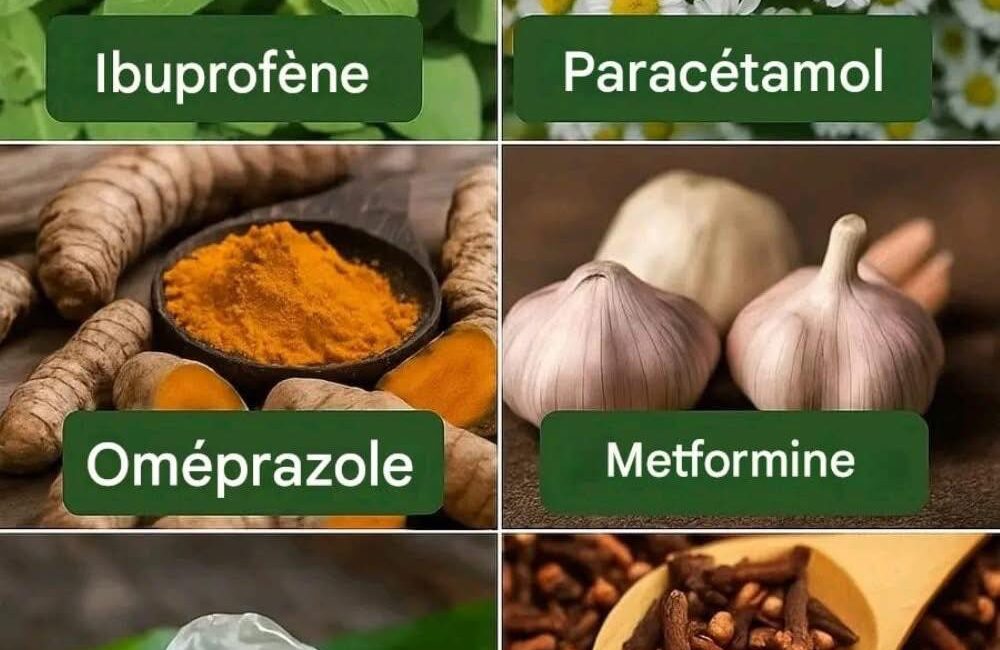- Natural anti-inflammatory and antioxidant: Turmeric fights chronic inflammation, often the cause of many modern diseases.
- Liver protection: Supports liver detoxification, aiding digestion and fat metabolism.
- Digestive aid: Stimulates bile production, improving food digestion.
Usage Tips
- Take 1 teaspoon of turmeric powder mixed with a bit of black pepper (which significantly increases curcumin absorption) after meals.
- Can be added to smoothies, soups, or taken as supplements.
Precautions
- Not recommended for those with gallstones or bile duct issues without medical advice.
- Be cautious with dosage to avoid digestive discomfort.
4. Garlic: A Powerful Ally Against Diabetes and Circulatory Issues
Origin and Composition
Garlic is a bulbous plant widely used worldwide for both culinary and medicinal qualities. Its sulfur compounds, such as allicin, give it potent therapeutic actions.
Major Benefits
- Natural blood sugar regulator: Helps stabilize blood sugar levels, crucial for preventing type 2 diabetes.
- Mild blood thinner: Improves blood circulation, reducing thrombosis risk.
- Antimicrobial and immune booster: Strengthens the body’s natural defenses.
How to Consume
- Eat 1 to 2 cloves of raw garlic daily, ideally crushed or chopped to release active compounds.
- Can be integrated into daily meals for prolonged effects.
Cautions
- Monitor consumption if on anticoagulant or antidiabetic medication to avoid interactions.
- Raw garlic may cause stomach irritation in sensitive individuals.
5. Aloe Vera (Babosa): Natural Healing and Antibacterial Care
Description
Aloe vera is a succulent plant globally recognized for its cosmetic and therapeutic virtues. The gel extracted from its leaves is rich in vitamins, enzymes, and amino acids.
Key Benefits
- Natural antibacterial: Protects against skin infections.
- Healing and soothing: Promotes repair of burns, cuts, irritations, and inflammations.
- Intense skin hydration: Used in many dermocosmetic products.
Usage
- External use only: apply pure gel on clean skin.
- Avoid ingestion without medical supervision due to potential toxicity.
6. Clove: Mild Analgesic and Antiseptic
Presentation
Clove is the dried flower bud of the clove tree, rich in eugenol, a compound with powerful analgesic and antiseptic properties.
Therapeutic Benefits
- Mild analgesic: Ideal for relieving toothaches, gum pain, or sore throats.
- Antiseptic: Protects against local bacterial infections.
- Digestive stimulant: Promotes digestion and reduces bloating.
How to Use
- Chew a clove for toothache relief.
- Infusion: a pinch of cloves in hot water to drink or use as a mouthwash.
- Use occasionally to avoid irritation.
Warnings
- Prolonged use may cause mouth irritation.
- Do not exceed recommended doses.
Incorporating These Plants into Your Health Routine: Practical Tips
- Choose quality plants: Prefer organic products from trusted sources to ensure purity and effectiveness.
- Consult a professional: Before starting any herbal regimen, especially if you have health conditions or are on medication.
- Respect dosages: Plants are potent and should be used carefully.
- Adopt a holistic approach: These plants complement a balanced diet and healthy lifestyle.
Conclusion
Medicinal plants are valuable allies to strengthen your health daily. Matalafi, Chamomile, Turmeric, Garlic, Aloe Vera, and Clove offer a range of natural benefits, from powerful anti-inflammatory effects to mild analgesia, metabolic regulation, and healing.
By incorporating these plants into your habits, you promote better health management, lasting well-being, and natural prevention against many common ailments.




